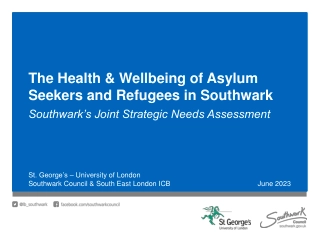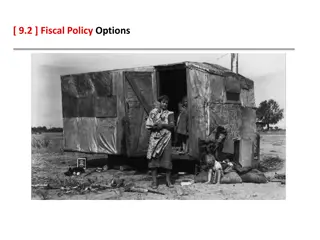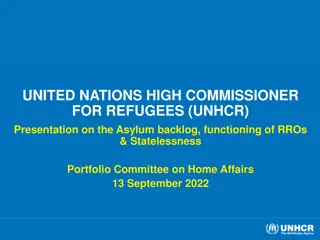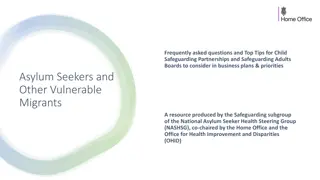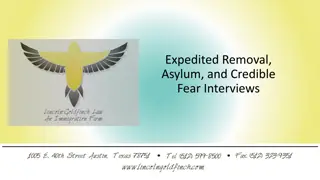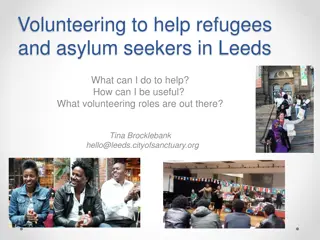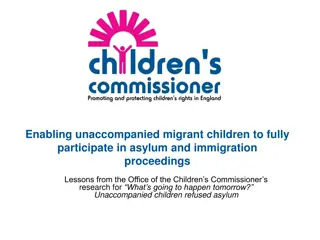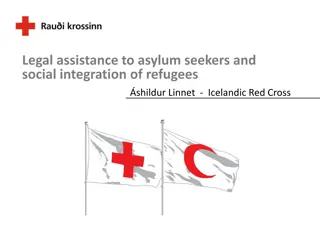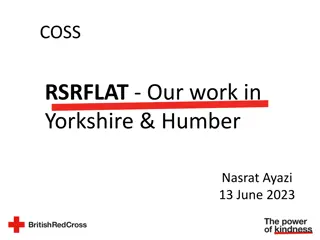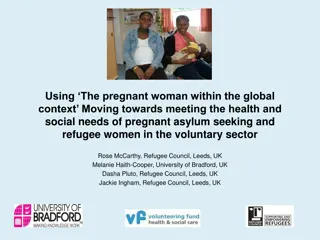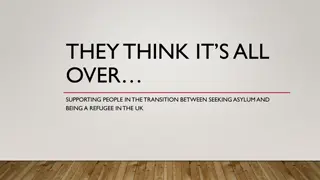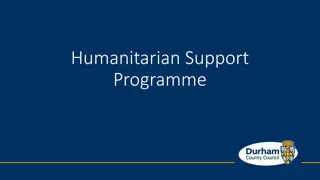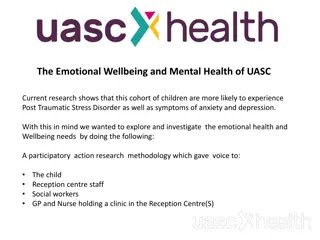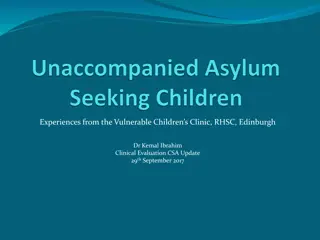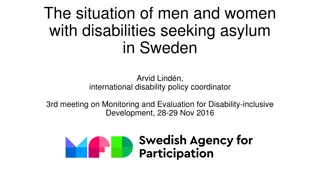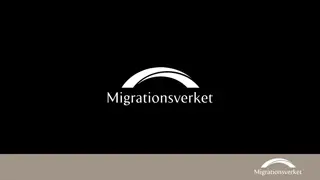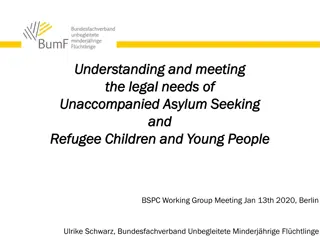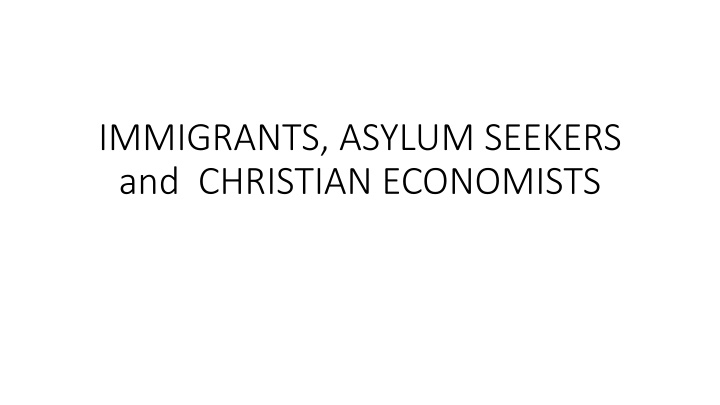
Christian Perspectives on Immigration: Biblical, Theological, and Economic Insights
Explore the intersection of immigration through Christian perspectives, showcasing biblical references, economic analysis, and insights from the Church. Understand the global refugee crisis, the duty to welcome strangers, and calls for a more welcoming stance in rich countries.
Download Presentation

Please find below an Image/Link to download the presentation.
The content on the website is provided AS IS for your information and personal use only. It may not be sold, licensed, or shared on other websites without obtaining consent from the author. If you encounter any issues during the download, it is possible that the publisher has removed the file from their server.
You are allowed to download the files provided on this website for personal or commercial use, subject to the condition that they are used lawfully. All files are the property of their respective owners.
The content on the website is provided AS IS for your information and personal use only. It may not be sold, licensed, or shared on other websites without obtaining consent from the author.
E N D
Presentation Transcript
IMMIGRANTS, ASYLUM SEEKERS and CHRISTIAN ECONOMISTS
Summary Recent refugee crises (especially Syrian) have exacerbated rich- country concerns over immigration Biblical and theological arguments favour welcoming immigrants, even those from different cultures Economic analysis suggests that benefits from immigration mostly outweigh costs (though there are distributional issues) Negative cultural externalities may also be overstated There may however be some strategic arguments for restrictions Christian economists in rich countries should argue for a much less hostile environment, both on ethical and efficiency grounds
Refugees: statistics (UNHCR Global Trends Refugees: statistics (UNHCR Global Trends 2018) 2018) Forcibly displaced persons number 70.8 million globally, of which UNHCR estimated (end 2018): 41.3 million internally displaced 25.9 million defined as refugees (20.4m UNHCR, 5.5m UNRWA) 3.5 million defined as asylum seekers Syrian refugees: 6.7 million (end 2018), of which: 3.4 million in Turkey 0.9 million in Lebanon 0.7 million in Jordan O.5 million in Germany
Biblical references Loving strangers: Old Testament Leviticus (19:33-34; 17:10); Exodus (20:10) Ruth (1:16) Loving strangers: New Testament Sheep and goats (Matt. 25:35) The Good Samaritan (Luke 10: 25-37)
The Church in recent times: Catholic Social Doctrine (italics added) Pacem in Terris: And among man s personal rights we must include his right to enter a country in which he hopes to be able to provide more fittingly for himself and his dependents. It is therefore the duty of State officials to accept such immigrants and so far as the good of their own community, rightly understood, permits to further the aims of those who may wish to become members of a new society. Catechism of the Catholic Church: ..the more prosperous nations [are obliged] to the extent that they are able, to welcome the foreigner in search of the security and the means of livelihood which he cannot find in his country of origin.
Other Christian Churches Open letter (multifaith) to the Prime Minister (Sept. 2016 ) offer sanctuary to more refugees pursue fair and humane family reunion policies WCC Executive Committee, Statement on People on the Move (Nov.2018): to raise national boundaries and the nation state to an order of value above the recognition of the image of God in every refugee and migrant is a kind of idolatry (critique of Orb n, Salvini, etc.)
Direct impact effects of immigration Labour markets: some studies (Docquier et al) show gains for from immigration for host-country employees; some show losses (Nickell and Salaheen); in neither case are the effects large. Infrastructure evidence inconclusive on private house prices (S ) immigrants under-represented in social housing, given needs (Battison et al); but there is congestion in areas of heavy settlement (housing, schools, hospitals) Tax and welfare payments 2001-2011 net positive contribution to revenues by immigrants around 25bn (Dustmann and Frattini).
Immigration: productivity effects Immigration has long-term effects on the economy as well as short- term ones on particular groups These include: complementarity of skills with locals transmission of skills to locals Increasing flexibility by filling labour shortages Evidence: Rolfe et al (2013)
Distributional implications Since on balance benefits probably outweigh losses in aggregate, compensation for losers should be possible; If political support for immigration is to be maintained, and in the interests of economic justice, actual compensation is essential. Surplus revenues from immigrant workers could be used to improve infrastructure, training, etc.
Cultural Issues Around Immigration The political economy of cultural diversity Putnam (2007): ethnic diversity reduces social capital Collier (2013): policy implications of Putnam Gesthuizen, van der Meer and Scheepers (2009): a European critique of Putnam Tastes for discrimination Trade-offs with income Experiential effects: contact with immigrants often seems to improve attitudes to immigrants over time (Fleming et al).
Strategic immigration policy? In UK, immigrants have freedom of worship. In source countries, they often don t. Source countries generally benefit from sending workers abroad, through Remittances (Barsbai) Acquisition of skills by returners (Dustmann and Weiss) Should we impose restrictions on immigration (other than refugees) from such countries, in attempts to ensure reciprocity? Problems: Political will in UK Enforcement capability in source countries
What may we contribute to the debate? There are strong arguments from Christian ethics for welcoming asylum seekers and treating their claims fairly. There is a solid economic case for further immigration, and cultural counter-arguments are overstated. The UK Borders Agency devotes substantial resources to finding reasons for keeping asylum seekers out: About one-third of appeals against rejection are upheld by a higher court Religious tests in particular are seriously flawed (Evangelical Alliance) Use of detention is expensive and excessive (Cambridge Econometrics) The hostile environment policy discourages immigrants from seeking medical or other social assistance These policies are economically inefficient, unjust and inhumane

